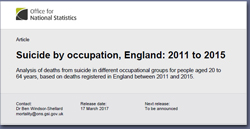Despite warnings from Trade Union's, mental health charities and academics, the Government continues to promote polices which damage work-life balance, causes severe stress and anxiety; and can lead to suicide!
We work the longest hours, have the fewest holidays and suffer the most stress at work than any other European country.
 The government though it's Office of National Statistics is fully aware of this situation, yet this Tory Government clammers for more working hours, is considering the removal of statutory sick pay, minimal annual leave rules, and the obligations upon employers to provide holiday pay and sick pay. Furthermore, irregular work patterns caused by zero-hours contracts, and security of work issues add to the stresses that most working people are now having to cope with.
The government though it's Office of National Statistics is fully aware of this situation, yet this Tory Government clammers for more working hours, is considering the removal of statutory sick pay, minimal annual leave rules, and the obligations upon employers to provide holiday pay and sick pay. Furthermore, irregular work patterns caused by zero-hours contracts, and security of work issues add to the stresses that most working people are now having to cope with.
A perfect example being of Government minister Liam Fox's recent statement that workers rights are keeping generations of workers unemployed and that:
"Political objections must be overridden. It is too difficult to hire and fire, and too expensive to take on new employees. It is intellectually unsustainable to believe that workplace rights should remain untouchable while output and employment are clearly cyclical."
The ONS report, both erroneously and appropriately entitled 'Suicide by Occupation in England: 2011 to 2015', analyses deaths from suicide in different occupational groups for people aged 20 to 64 years, based on deaths registered in England between 2011 and 2015.
 Dave Joyce, CWU's National Health, Safety & Environment Officer comments on the ONS report into suicide levers in this country, in his latest letter to CWU branches (LTB175/17):
Dave Joyce, CWU's National Health, Safety & Environment Officer comments on the ONS report into suicide levers in this country, in his latest letter to CWU branches (LTB175/17):
Suicide is the leading cause of death in England and the UK in adults below the age of 50 and past research shows that some occupations are at particularly high risk. This new report describes recent analysis of deaths from suicide in different occupational groups among those aged 20 to 64 years. Such analysis can inform targeted suicide prevention measures and provide a broader understanding of influences on suicide.
Therefore this report will be of interest to Union Officials throughout the Union. The new report contains quite detailed occupational breakdowns for many types of jobs and sectors both for male and female workers. It shows that there are clear links between work and the risk of suicide which makes it a significant issue for Trade Unions.
The report also demolishes a lot of stereotypes and shows that suicide is more common among low paid or manual workers. For instance, individuals working in roles as managers, directors and senior officials – the highest paid occupation group – had the lowest risk of suicide. Among corporate managers and directors the risk of suicide was more than 70% lower for both sexes. Contrasting that were low skilled, low paid workers such as male labourers, particularly those working in construction, who had a three times higher risk of suicide than the national average.
ONS Report's Main points
- There were 18,998 suicides in men and women aged between 20 and 64 years between 2011 and 2015, which constitutes a rate of around 12 deaths for every 100,000 people per year; for around 7 in 10 (13,232) of these suicides, an occupation was provided at the time of death registration.
- Males working in the lowest-skilled occupations had a 44% higher risk of suicide than the male national average; the risk among males in skilled trades was 35% higher.
- The risk of suicide among low-skilled male labourers, particularly those working in construction roles, was 3 times higher than the male national average.
- For males working in skilled trades, the highest risk was among building finishing trades; particularly, plasterers and painters and decorators had more than double the risk of suicide than the male national average.
- The risk of suicide was elevated for those in culture, media and sport occupations for males (20% higher than the male average) and females (69% higher); risk was highest among those working in artistic, literary and media occupations.
- For females, the risk of suicide among health professionals was 24% higher than the female national average; this is largely explained by high suicide risk among female nurses.
- Male and female carers had a risk of suicide that was almost twice the national average.
- Females within the teaching and education profession had a lower risk of suicide but specifically for primary and nursery schoolteachers there was evidence of an elevated risk.
- Individuals working in roles as managers, directors and senior officials – the highest paid occupation group – had the lowest risk of suicide. Among corporate managers and directors the risk of suicide was more than 70% lower for both sexes.
Dave lists at the end of the LTB, details of support groups dealing with the prevention of suicide:
Where to go for help
The Samaritans
The report advises those struggling to cope and needing someone to talk to, to either:-
Samaritans are available round the clock, every single day of the year, providing a safe place for anyone struggling to cope, whoever they are, however they feel, whatever life has done to them.
Contact Details For “Samaritans” England, Scotland, Wales and Ireland
Samaritans Central Office England
Central Office telephone: +44 (0)20 8394 8300
Central Office email: admin@samaritans.org
Central Office postal address: The Upper Mill, Kingston Road, Ewell, Surrey KT17 2AF
Samaritans in Ireland
Ireland Office telephone: +353 1 6710071
Ireland Office email: ireland@samaritans.org
Ireland Office postal address: 4-5 Usher's Court, Usher's Quay, Dublin 8
Samaritans in Scotland
Scotland Office telephone: +44 (0)131 556 7058
Scotland Office email: scotland@samaritans.org
Scotland Office postal address: CBC House, 24 Canning Street, Edinburgh EH3 8EG
Samaritans in Wales
Wales Office telephone: +44 (0)29 2022 2008
Wales Office email: wales@samaritans.org
Wales Office postal address: Floor 2, 33-35 Cathedral Road, Cardiff CF11 9HB
You can download the ONS report from the E-Library Database by choosing search category 'Mental Health' from the drop-down menu.
Source: CWU / ONS



 Dave Joyce, CWU's National Health, Safety & Environment Officer comments on the ONS report into suicide levers in this country, in his latest letter to CWU branches (LTB175/17):
Dave Joyce, CWU's National Health, Safety & Environment Officer comments on the ONS report into suicide levers in this country, in his latest letter to CWU branches (LTB175/17):